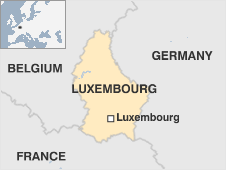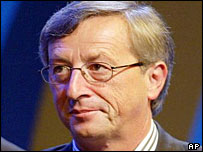 |
The Grand Duchy of Luxembourg - a small country landlocked by Belgium France and Germany - is a prominent banking centre and tax haven.
With roots stretching back to the 10th century Luxembourg's history is closely intertwined with that of its more powerful neighbours especially Germany.
Many of its inhabitants are trilingual in French German and Luxembourgish
- a dialect of German.
Overview
Despite declaring its neutrality Luxembourg was occupied by Germany during both World Wars. Attempts to escape German influence initially led to an economic union with Belgium in 1921.
After renewed occupation in World War II Luxembourg abandoned its neutrality and became a front-rank enthusiast for international co-operation.
Luxembourg became a founder member of a customs union with Belgium and the Netherlands in 1948 and of the European Economic Community a forerunner of the European Union in 1957. Around one-third of Luxembourg's population are foreigners.
Luxembourg's prosperity was formerly based on steel manufacturing. With the decline of that industry Luxembourg diversified and is now best known for its status as a tax haven and banking centre.
But Luxembourg's strict laws on banking secrecy mean the system can be exploited for the purposes of tax evasion and fraud.
Luxembourg's politics are characterised by stability and long-serving administrations.
This tranquillity was interrupted in 2008 when Grand Duke Henri said his conscience would not allow him to sign into law a bill approving euthanasia.
The crisis was resolved by a constitutional reform which removed the need for laws to be approved by the monarch reducing the post to a largely ceremonial role.
Facts
- Full name: Grand Duchy of Luxembourg
- Population: 486000 (UN 2009)
- Capital: Luxembourg
- Area: 2586 sq km (999 sq miles)
- Major languages: French German Luxembourgish
- Major religion: Christianity
- Life expectancy: 77 years (men) 82 years (women) (UN)
- Monetary unit: 1 Euro = 100 cents
- Main exports: Steel products chemicals rubber products
- GNI per capita: US $84890 (World Bank 2008)
- Internet domain: .lu
- International dialling code: +352
Leaders
Head of state: Grand Duke Henri

Prime Minister Juncker
|
Prime minister: Jean-Claude Juncker
Jean-Claude Juncker of the conservative Christian Social Party has been prime minister since 1995 when his predecessor Jacques Santer became president of the European Commission.
He carries on as premier in coalition with the Socialist Workers Party following general elections in June 2004. For the five years before that his party had formed a coalition government with the Democratic Party.
Jean-Claude Juncker was born in 1954 and is a lawyer by training.
Media
Luxembourg exerts immense media clout and has a long tradition of operating radio and TV services for pan-European audiences including those in France Germany and the UK.
The Luxembourg-based media group RTL is behind much of this activity. RTL's radio stations have been a part of the broadcasting landscape in France and Germany for decades.
Generations of British listeners grew up with Radio Luxembourg which beamed pop music programmes into the UK on the legendary "208" wavelength. "The Great 208" is no more but RTL's TV and radio stations remain key players in media markets across Europe.
Luxembourg's media empire extends to the skies. The country is home to Europe's largest satellite operator Societe Europeenne des Satellites (SES) which operates the Astra satellite fleet.
RTL and other privately-owned radio and TV stations broadcast to domestic audiences. The constitution guarantees freedom of speech and of the press. Print media are privately owned and reflect diverse viewpoints.
The press
Television
- RTL Tele Letzebuerg - RTL's domestic network
- Nordliicht TV - station for northern Luxembourg
Radio
- RTL Radio Letzebuerg - RTL's domestic network
- Den Neien Radio - commercial network
- Radio ARA - variety of music some English-language programmes
- EldoRadio - pop music
-
Honnert7 (100.7) - public cultural
AFRICA | ASIA-PACIFIC | AMERICAS | EUROPE | MIDDLEEAST | SOUTHASIA
Mauritania Mauritius Morocco Mozambique Namibia Niger Nigeria Republic-of-congo Rwanda Sao-tome-and-principe Senegal Seychelles Sierra-leone Somalia South-africa Sudan Swaziland Tanzania The-gambia Togo Tunisia Uganda zambia Zimbabwe Australia Brunei Burma Cambodia China East-timor Fiji Indonesia Japan Kazakhstan Kiribati Kyrgyzstan Laos Malaysia Marshall-islands Micronesia Mongolia Nauru New-zealand North-korea Palau Papua-new-guinea Samoa Singapore Solomon-islands South-korea Taiwan Tajikistan Thailand The-philippines Tonga Turkmenistan Tuvalu Uzbekistan Vanuatu Vietnam Antigua-and-barbuda Argentina Bahamas Barbados Belize Bolivia Brazil Canada Chile Colombia Costa-rica Cuba Dominica Dominican-republic Ecuador El-salvador Grenada Guatemala GuyanaHaiti Honduras Jamaica Mexico Nicaragua Panama Paraguay Peru St-kitts-and-nevis St-lucia St-vincent-and-the-grenadines Suriname Trinidad-and-tobago United-states-of-america Uruguay Venezuela Albania Andorra Armenia Austria Azerbaijan Belarus Belgium Bosnia-hercegovina Bulgaria Croatia Cyprus Czech-republic Denmark Estonia Finland France Georgia Germany Greece Hungary Iceland Ireland Italy Latvia Liechtenstein Lithuania Luxembourg Macedonia Malta Moldova Monaco Montenegro Norway Poland Portugal Russia San-marino Serbia Slovakia Slovenia Spain Sweden Switzerland The-netherlands Turkey Ukraine United-kingdom Vatican Algeria Egypt Iran Iraq Israel-and-palestinian-territories Jordan Kuwait Lebanon Libya Mauritania Oman Saudi-arabia Sudan Syria Tunisia United-arab-emirates Yemen Afghanistan Bangladesh Bhutan India Nepal Pakistan Sri-Lanka The-Maldives

